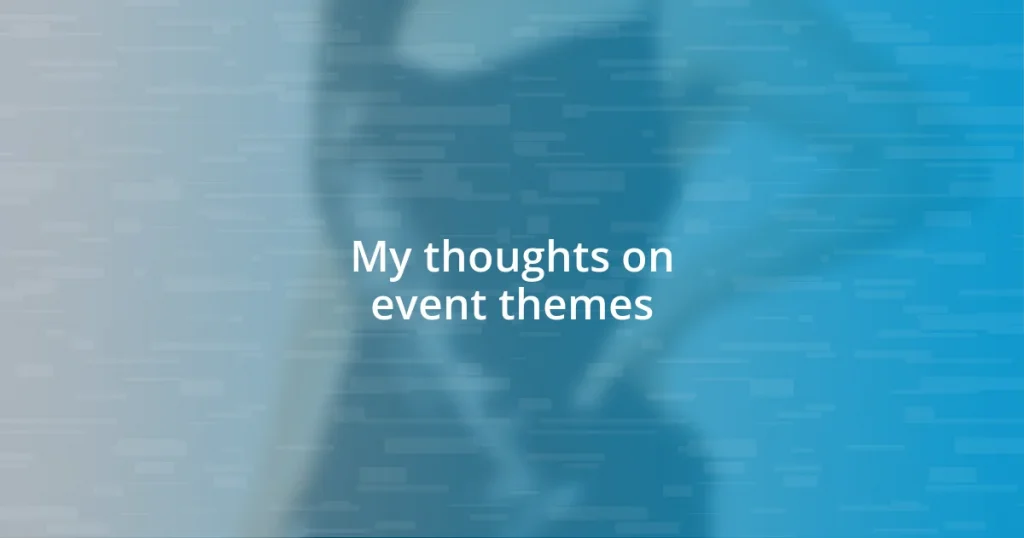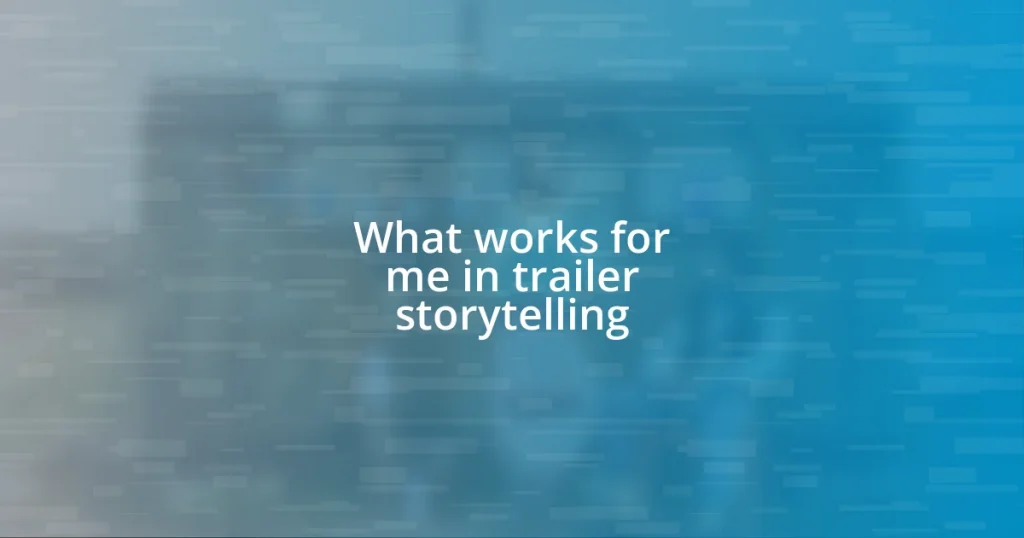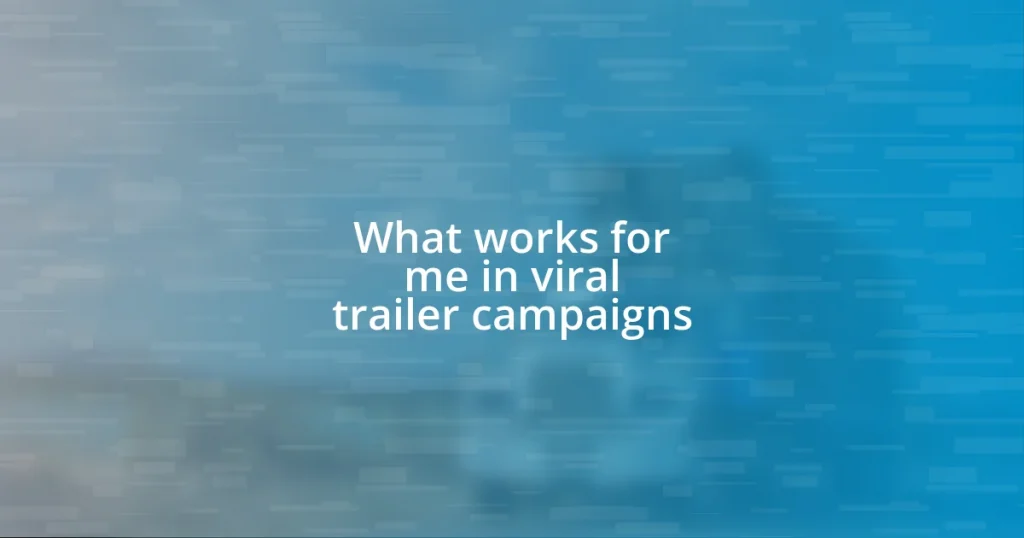Key takeaways:
- A well-defined event theme enhances attendee engagement and creates immersive experiences that foster connections.
- Effective themes aid in event marketing and can significantly boost attendance and community spirit.
- The emotional impact of a theme, through nostalgic or interactive elements, can lead to memorable experiences and lasting relationships among attendees.
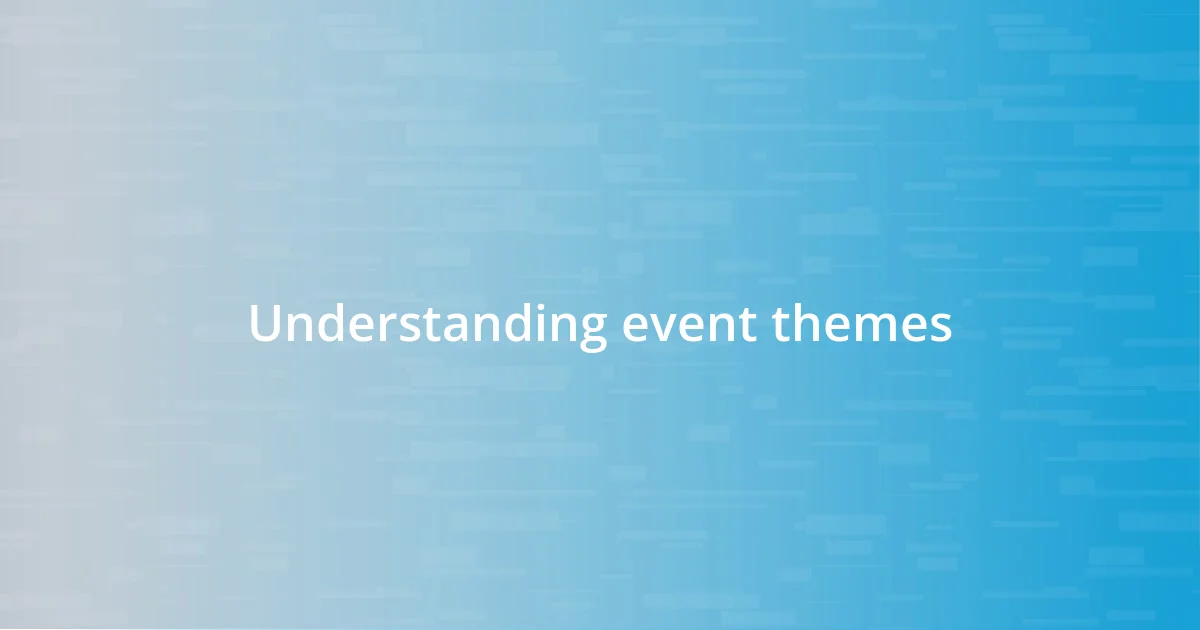
Understanding event themes
Understanding event themes is essential for creating a memorable and cohesive experience. I’ve noticed that when an event has a clear theme, attendees engage more deeply. Have you ever walked into a venue decorated in line with the event’s concept and felt an immediate connection? It’s like stepping into a different world.
Themes are not just about aesthetics; they also set the tone and guide the overall event experience. I can recall an event I attended themed around the roaring twenties, where every detail—from the jazz band to the flapper dresses—immersed us in that vibrant era. It sparked conversations and excitement, making it unforgettable. This illustrates how a well-defined theme can turn a simple gathering into an extraordinary experience.
Moreover, understanding event themes involves recognizing your audience’s preferences and interests. For instance, I once organized a farmer’s market where we centered everything around sustainability. The feedback was overwhelming; people felt they were part of something meaningful. What themes resonate with you? Identifying such connections can transform a standard event into a cherished memory.
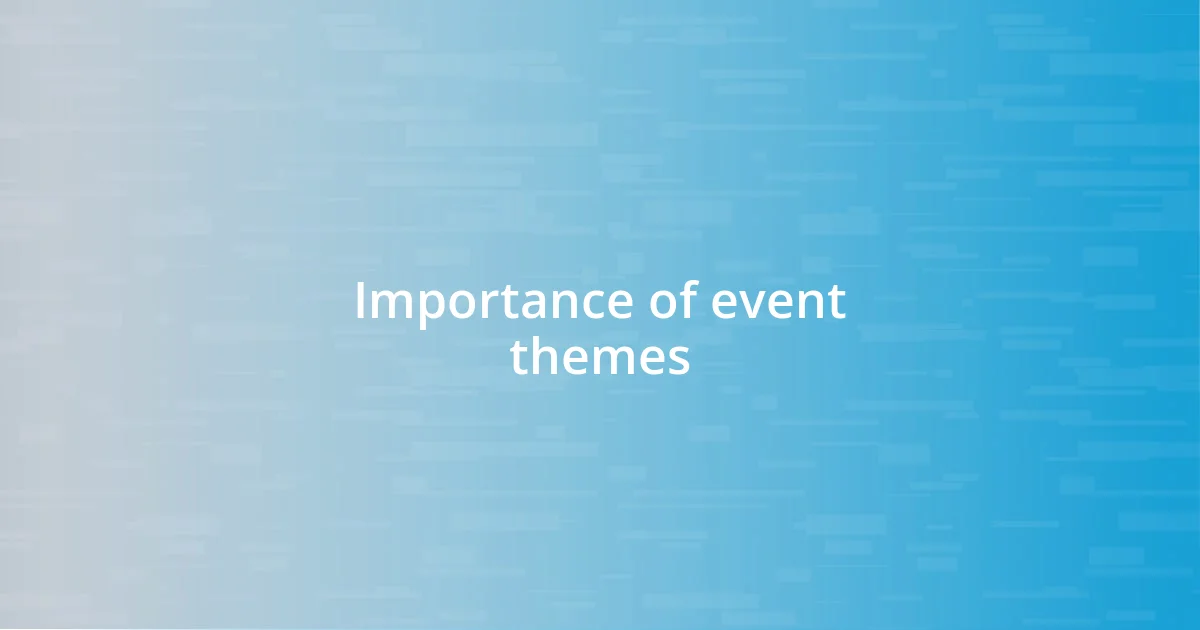
Importance of event themes
Event themes are crucial because they create a unified vision that guides every aspect of an event. I remember organizing an evening gala with a celestial theme. From the starry decor to the space-inspired menu, every detail resonated with our guests, making them feel part of a magical experience. That kind of immersion is what truly elevates an event from being forgettable to unforgettable.
Having a strong theme also helps in marketing and promoting the event. I’ve seen how a well-chosen theme can captivate an audience and drive ticket sales. For example, when I was involved in a charity event themed around “Under the Sea,” the vibrant imagery and playful messaging really drew people in. It wasn’t just an event; it was an adventure that piqued interest and fostered community spirit.
Ultimately, event themes foster a sense of connection. They give attendees something to talk about and engage with, creating shared memories. I’ve experienced this firsthand at a rustic-themed wedding I attended, where the barn-like setup encouraged guests to mingle and share stories. In a world where people crave connection, themes can serve as that essential link, making gatherings more memorable and meaningful.
| Importance of Event Themes | Examples from Experience |
|---|---|
| Creates immersive experiences | Celestial gala decor enhanced the atmosphere |
| Boosts marketing efforts | “Under the Sea” theme attracted more attendees |
| Fosters attendee connection | Rustic wedding setup encouraged mingling |
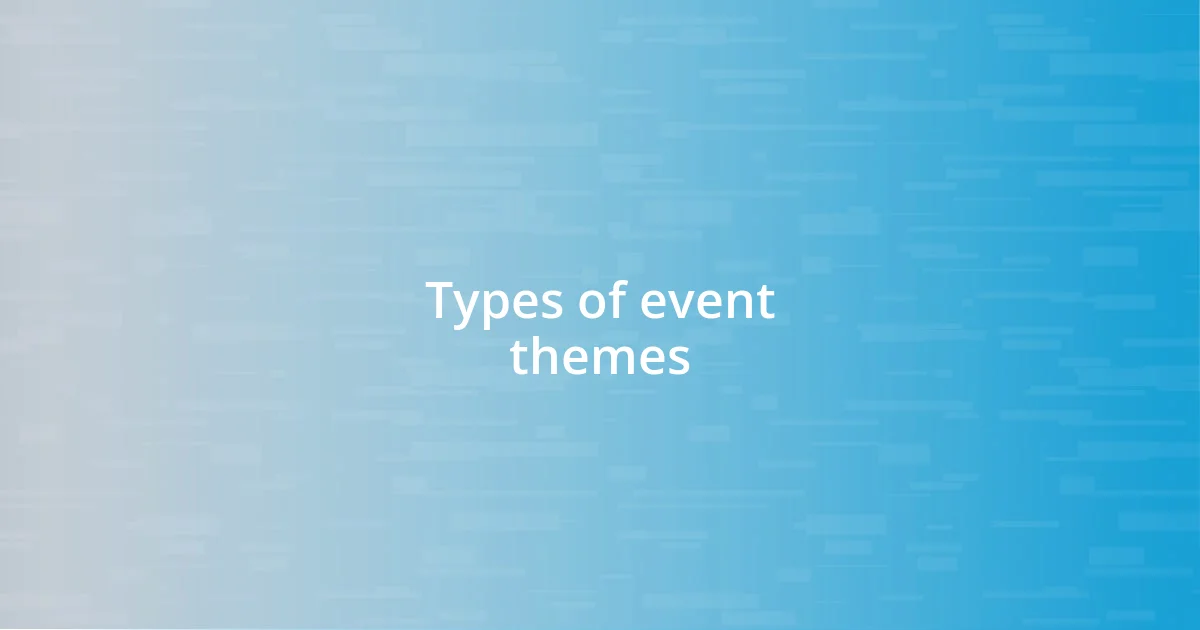
Types of event themes
Event themes come in various forms, each offering distinct ways to engage and connect with attendees. I’ve always found that themed events can range from casual to extravagant. A personal favorite of mine was a Masquerade Ball I attended, where the mystery of hidden faces added an exciting touch to the evening. As I danced under the shimmering chandeliers, the air was filled with enchantment, making it a truly memorable experience.
Here are some popular types of event themes:
- Seasonal Themes: Celebrating spring with floral motifs or winter with cozy elements.
- Cultural Themes: Highlighting specific traditions or styles, such as an Italian or Hawaiian luau.
- Decade Themes: Transporting guests back in time, like a retro ’80s party or a groovy ’70s disco.
- Inspirational Themes: Focusing on empowerment, creativity, or wellness, such as a “Rise and Shine” motivational event.
- Nature Themes: Emphasizing outdoor elements or sustainability, perfect for eco-friendliness.
I’ve organized a few events that not only had interesting themes but also focused on forging connections among guests. For instance, at a cozy book-themed gathering, we all shared our favorite reads, and the atmosphere felt intimate and warm, just like sitting around a fireplace with good friends. This unique approach really demonstrated how themes can enhance the overall experience, creating lasting memories and friendships in the process.
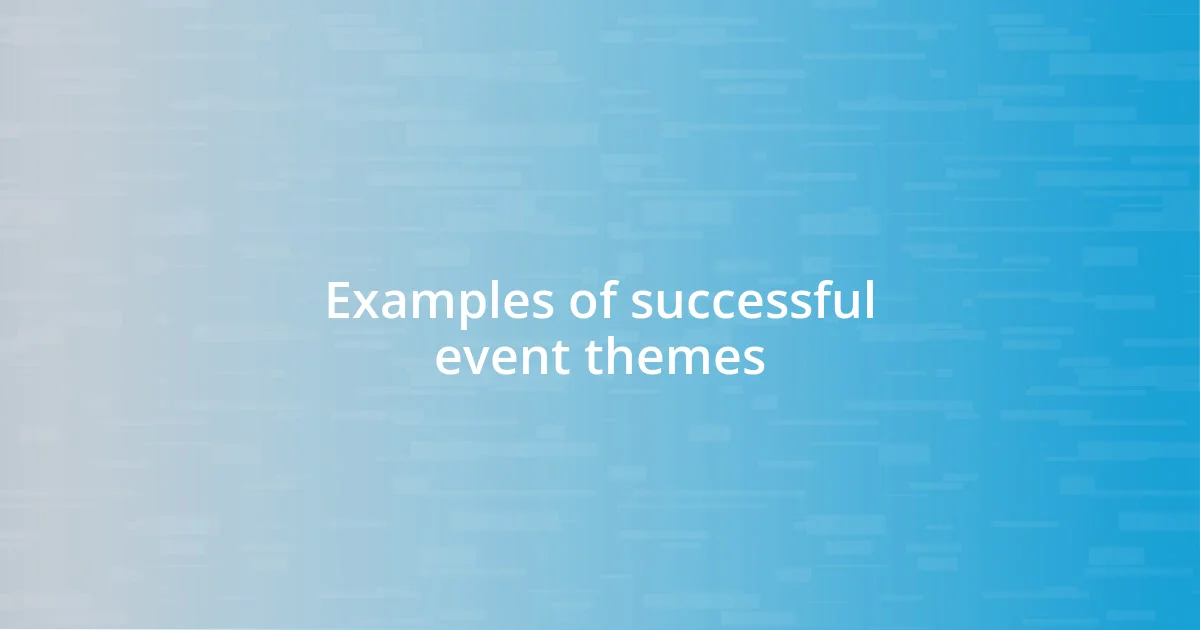
Examples of successful event themes
One event that truly stands out in my memory is a “Great Gatsby” themed party I attended. The elegance of the 1920s was palpable, from flapper dresses to period-inspired cocktails. I couldn’t help but feel transported to another era, where everyone embodied the playful spirit of the Roaring Twenties. Isn’t it fascinating how a single theme can evoke such vibrant imagery and excitement?
Another remarkable example was an “Around the World” event I helped organize. Each room represented a different country, complete with corresponding cuisine and decor. As I sampled dishes from Italy, Japan, and Mexico, I felt like a traveler without leaving my city. This kind of immersive experience truly opened my eyes to the possibilities of thematic diversity. Have you ever wished you could explore multiple cultures in one evening? This theme made that dream a reality.
A more intimate event I was involved with revolved around a “Books and Brews” theme, combining literature with craft beer tasting. Guests were encouraged to bring their favorite book, and we created cozy reading nooks paired with brew selections that resonated with each story. The room buzzed with laughter and conversation as individuals connected over mutual interests, deepening bonds that often linger long after the event. I still cherish the connections I made that night. How often have you walked away from a gathering feeling like you’ve found like-minded friends? Themes can create those moments of connection seamlessly.
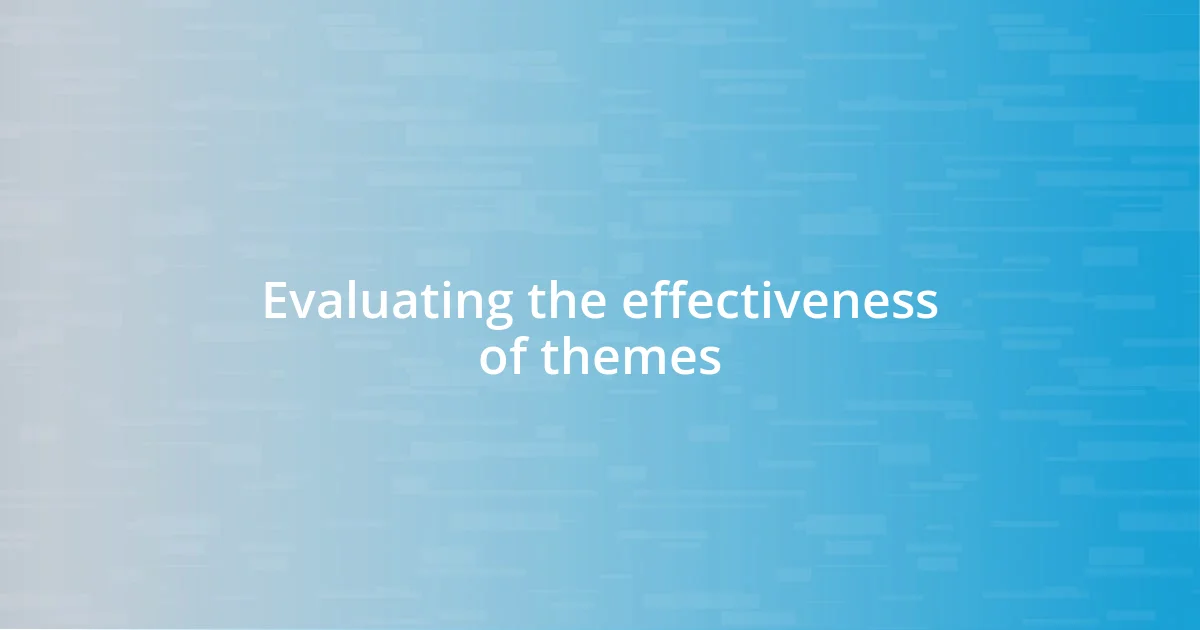
Evaluating the effectiveness of themes
When evaluating the effectiveness of themes, I often look for how they resonate with attendees. For example, I once attended a holiday-themed corporate event that creatively blended traditional elements with modern twists. By setting up interactive stations where guests could decorate cookies and craft ornaments, it fostered a sense of community and engagement. Isn’t it amazing how hands-on activities can spark connection?
Another aspect I consider is the overall atmosphere the theme creates. I remember an art-inspired gala where each table was designed by a different local artist. The vibrancy and allure of the decor not only impressed attendees but also inspired conversations about creativity and passion. Just think about how a rich environment can transform an ordinary gathering into an unforgettable experience!
Lastly, I pay close attention to the emotional impact a theme has on participants. During a nostalgic retro party I organized, the music selection transported guests back to their teenage years, igniting laughter and shared memories. Those moments made it evident that effective themes can evoke deep feelings and connections. Have you ever found yourself reminiscing with strangers over a song that tied you to a cherished time? It’s those connections that make themed events truly memorable.











